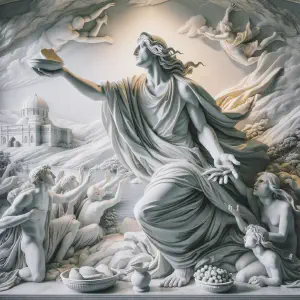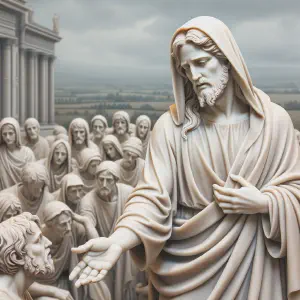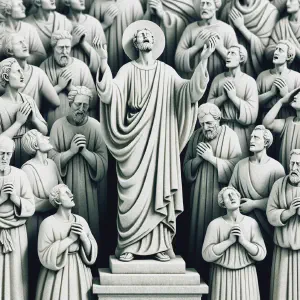The Promise of Restoration and Mission



In the Gospel, the embodiment of this hope and promise walked the earth. Jesus, moving through towns and villages, taught, proclaimed, and healed. His compassion for the crowds, likened to sheep without a shepherd, led Him to call for laborers for the abundant harvest. Empowering His disciples, He sent them to continue His work: to heal, to raise, to cleanse, and to drive out demons. They were to give freely, echoing the Lord’s generosity. This was the manifestation of the Kingdom of Heaven – a mission not just of words, but of transformative action, signaling a new era of God’s intimate involvement with His people.
Five Questions
What does the prophecy in Isaiah 30 signify for the people of Israel?
The prophecy in Isaiah 30 is a beacon of hope and assurance for the people of Israel. It signifies a turning point where God promises to be responsive to their cries, providing them with necessary sustenance and guidance. The imagery of no more weeping, receiving bread and water, and the promise of seeing their Teacher represent God’s providence and presence in their lives. It’s a shift from a time of hardship to a period of divine grace and blessing.
How does Psalm 147 complement the message in Isaiah?
Psalm 147 reinforces and complements Isaiah’s message by highlighting God’s role as a healer and restorer. It speaks of God rebuilding Jerusalem and gathering the dispersed of Israel, which mirrors the theme of restoration in Isaiah. The Psalm also emphasizes God’s intimate care, like healing the brokenhearted and knowing the stars by name, which underscores His omnipotence and compassion, further illustrating the personal relationship God seeks with His people.
In the context of these scriptures, how is Jesus’ mission in Matthew 9:35–10:1 significant?
Jesus’ mission in Matthew is the realization of the promises made in Isaiah and celebrated in the Psalm. His journey through towns and villages, teaching, proclaiming the Gospel, and healing, is a physical manifestation of God’s compassion and care. By addressing both spiritual and physical needs, Jesus embodies the hope and healing foretold by the prophets. His actions and the empowerment of his disciples to continue this mission demonstrate the inauguration of the Kingdom of Heaven on Earth.
What is the significance of Jesus asking for laborers in the harvest?
This metaphor of the harvest signifies the abundance of people ready to receive the Gospel and the need for workers to spread God’s word. By referring to His disciples as laborers in a plentiful harvest, Jesus emphasizes the urgent and communal nature of His mission. It’s a call to action for the disciples, and by extension all believers, to actively participate in spreading the message of hope, healing, and redemption that Jesus brings.
How do these scriptures collectively guide a modern Christian’s life?
Collectively, these scriptures guide modern Christians by emphasizing trust in God’s providence, the importance of compassion, and the active participation in God’s mission. They remind us that God hears and responds to our needs, heals our wounds, and calls us to be part of a larger purpose. By following Jesus’ example of service and outreach, Christians are encouraged to spread hope, practice healing in various forms, and contribute to building a community that reflects the Kingdom of Heaven.
Bible Study
Isaiah 30:19-21, 23-26
Thus says the Lord GOD,
the Holy One of Israel:
O people of Zion, who dwell in Jerusalem,
no more will you weep;
He will be gracious to you when you cry out,
as soon as he hears he will answer you.
The Lord will give you the bread you need
and the water for which you thirst.
No longer will your Teacher hide himself,
but with your own eyes you shall see your Teacher,
While from behind, a voice shall sound in your ears:
“This is the way; walk in it,”
when you would turn to the right or to the left.
He will give rain for the seed
that you sow in the ground,
And the wheat that the soil produces
will be rich and abundant.
On that day your flock will be given pasture
and the lamb will graze in spacious meadows;
The oxen and the asses that till the ground
will eat silage tossed to them
with shovel and pitchfork.
Upon every high mountain and lofty hill
there will be streams of running water.
On the day of the great slaughter,
when the towers fall,
The light of the moon will be like that of the sun
and the light of the sun will be seven times greater
like the light of seven days.
On the day the LORD binds up the wounds of his people,
he will heal the bruises left by his blows.
This passage presents God as the compassionate and provident savior of Israel. It reflects Catholic values of trusting in God’s providence and the importance of divine guidance. The promise of God’s direct teaching aligns with the value of seeking wisdom through faith. The imagery of abundant harvest and healing resonates with the Catholic understanding of God’s grace as nourishing and restorative, paralleling the Eucharistic themes of bread and wine as sustenance.
Psalm 147:1-2, 3-4, 5-6
R. (see Isaiah 30:18d) Blessed are all who wait for the Lord.
Praise the LORD, for he is good;
sing praise to our God, for he is gracious;
it is fitting to praise him.
The LORD rebuilds Jerusalem;
the dispersed of Israel he gathers.
R. Blessed are all who wait for the Lord.
He heals the brokenhearted
and binds up their wounds.
He tells the number of the stars;
he calls each by name.
R. Blessed are all who wait for the Lord.
Great is our LORD and mighty in power:
to his wisdom there is no limit.
The LORD sustains the lowly;
the wicked he casts to the ground.
R. Blessed are all who wait for the Lord.
Psalm 147 portrays God as the healer and restorer, gathering the dispersed Israelites and healing the brokenhearted. This aligns with Catholic values of caring for the marginalized and the act of mercy in comforting the sorrowful. The Psalm emphasizes God’s omnipotence and omniscience, resonating with Catholic teachings on the nature of God. The acts of rebuilding Jerusalem and naming the stars reflect God’s intimate involvement with both community and individual lives, underscoring the Catholic doctrine of God’s personal love and care.
Matthew 9:35–10:1, 5a, 6-8
Jesus went around to all the towns and villages,
teaching in their synagogues,
proclaiming the Gospel of the Kingdom,
and curing every disease and illness.
At the sight of the crowds, his heart was moved with pity for them
because they were troubled and abandoned,
like sheep without a shepherd.
Then he said to his disciples,
“The harvest is abundant but the laborers are few;
so ask the master of the harvest
to send out laborers for his harvest.”
Then he summoned his Twelve disciples
and gave them authority over unclean spirits to drive them out
and to cure every disease and every illness.
Jesus sent out these Twelve after instructing them thus,
“Go to the lost sheep of the house of Israel.
As you go, make this proclamation: ‘The Kingdom of heaven is at hand.’
Cure the sick, raise the dead,
cleanse lepers, drive out demons.
Without cost you have received; without cost you are to give.”
This Gospel passage depicts Jesus as a compassionate healer and teacher, embodying the fulfillment of Old Testament prophecies. His ministry of teaching, healing, and empowering His disciples reflects Catholic values of service, compassion, and the call to apostolic action. The sending out of the disciples highlights the Catholic principle of missionary work and the universal call to holiness. This passage aligns with the Catholic emphasis on acts of mercy, particularly in healing the sick and comforting the afflicted, and underscores the gratuitous nature of grace – received freely and given freely.
Lessons
These sacred readings impart lessons of hope, healing, and the call to mission. Isaiah speaks of God’s promise to answer the cries of His people, providing for their needs and guiding them directly. The Psalm emphasizes God’s role as a healer and restorer. In the Gospel, Jesus exemplifies this divine compassion, feeling deeply for those in need and empowering His disciples to continue His work of healing and preaching the Kingdom of Heaven. The overarching message is one of trust in God’s providence, the importance of compassion, and the call for each of us to partake in God’s mission of love and restoration.
Meditation Prayer


